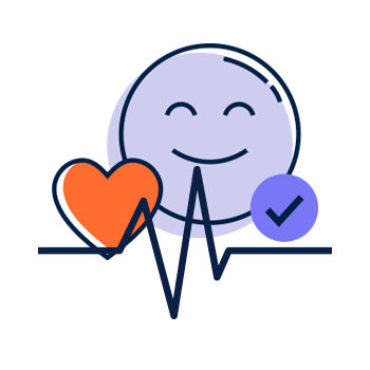
Health Tracker
40% of us will receive a cancer diagnosis in our lifetime. A cancer diagnosis is not a death sentence. Many people live healthy and productive lives following their diagnosis. Key to securing a positive outcome is detecting cancer early, but would you recognize a potential cancer symptom?
The 11 questions below are designed to help you determine “your great” health. They help you establish your baseline. When things vary from your “great,” for two weeks or longer, it is time to check in with your doctor.
11 Questions That Might Save Your Life
Use our Health Tracker template every three months to log any health changes that should be brought to your healthcare provider’s attention. DOWNLOAD (EXCEL) | DOWNLOAD (PDF)
1. Do you have annual physical? If yes, when was the date of your last appointment?
2. What best describes your energy level today?
- Very high. Bursting with energy, always moving and thinking.
- High. More energy than most. I need little down time and prefer to be active
- Average. Energy when I need it, but I needed down time too.
- A bit low. I move slower than most, but I get through the day.
- Low. I feel I need a nap on most days. Think back over the last 6 months, when did you notice the change? Within month/last 6 months/in the last year?
3. How would you describe your physical strength right now? (When answering this question, think about how you’d describe your physical strength 6 months ago? 1 year ago?)
- Really strong. I can easily carry multiple bags of groceries at the same time, move furniture. I can exercise and weight train regularly.
- Pretty strong. I can carry a small child, easily able to move light furniture and perform daily activities.
- Not that strong. I can carry light groceries but do need help with some daily activities.
4. On average, how many bowel movements do you have each day?
(When answering this questions, would you say you go more, less, or about the same as 6 months ago? Have you noticed changes in your poop? If yes, what changed (frequency, consistency, presence of blood/discharge)?
- Less than once a day
- 1 time a day
- 2–3 times a day
- 3+ times a day
5. Over the past month, has your appetite increased, decreased, been about the same?
6. Have you experienced changes in your weight?
Weigh yourself and in 3 months ask, did you lose weight? (An unexplained 5% weight loss is concerning.)
- If yes, did you diet? exercise?
7. Look at your skin, specifically freckles and moles, have they changed in shape, size, and/or texture? If yes:
- When did you notice the change?
- How has it changed? Size, shape, and/or texture?
- Where is it located on your body?
- Have you had the mole checked?
8. Over the past 2–4 weeks, have you felt any new physical pain that either comes and goes or that you feel most of the time. If yes:
- Rate pain level on a scale from 1 (no pain) to 10 (worst possible)
- Where on the body do experience pain?
- How long have you been experiencing this pain? Just started? A few weeks? A few months? A long time?
- How has the pain level changed over time? Same? Worse? Better?
9. Over the past 2–4 weeks, have you noticed any new lumps or bumps anywhere on your body? Any thickening or swelling in your neck?
10. Have you been regularly experiencing any of the following health changes for more than two weeks or longer?
- New cough
- Sore throat
- Excess sweating
- Chills
- Fevers
- Headaches
- Vision changes
- Rashes/itchy skin
- Blood in your urine or stool
- Trouble swallowing
- Easily bruising over the past month
- Over the past few months, noticed changes in your menstrual cycle (frequency, flow, duration, increased or new pain)
11. Has any immediate family member or grandparent have the following medical conditions?
When listing the diseases/conditions, also note relationship of family member to you (mother, father, sister, brother, etc.), age at diagnosis if known and if this was the cause of death and age of death.
- High blood pressure
- High cholesterol
- Heart attach/heart disease
- Diabetes
- Cancer; yes, what type?
- Osteoporosis
- Depression
- Alcoholism/drug abuse
- Dementia/Alzheimer’s
- Asthma
- Autoimmune disease
- Bleeding or clotting disorder
- Emphysema (COPD)
- Genetic disorder (explain)
- Glaucoma
- Hepatitis B or C
- Thyroid disease
- Kidney disease
- Macular degeneration
- Stoke
- Other (note)
Learn more why knowing your family history is important and download a family history form to help keep track of the information.